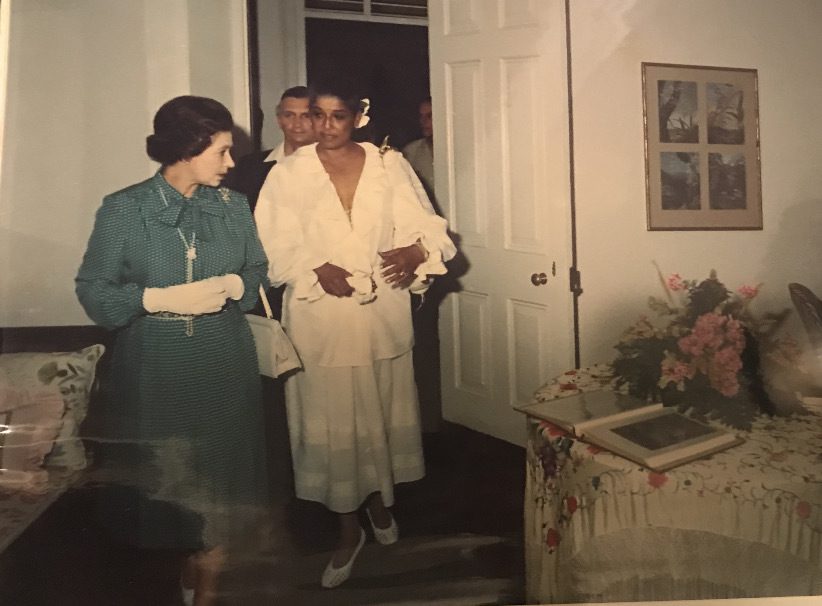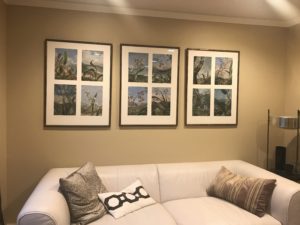
Courtesy of Anabel Moore
Black photo albums, treasure troves of almost 70 years of my nuclear family’s personal histories, are stacked in a cupboard in my living room. Each houses a different flavor of sweet nostalgia: the ’50s and ’60s of my dad’s idyllic childhood in Jamaica, the stainless-steel playgrounds of my mom’s ’70s in Minnesota, the Kenyan savannah of my brothers’ late ’80s and my cherub-cheeked ownership of the new millennium, testing the boundaries of Caribbean fauna.
There is a crown jewel amongst these albums, inconspicuous save for its unwieldy bindings. It holds a sliver of photographic reproductions of 15 original mixed media paintings of Jamaica’s orchids. The original paintings by Charlotte Hall were considered by the late Alex D. Hawkes — a noted botanist and horticulturist — to be amongst the most enchanting and delightful he had ever encountered anywhere in the world.
Charlotte Hall was my great-great-great-grandmother and a painter of considerable talent who used the profits from her works to support and educate her young family. The orchid paintings now live in my parents’ home.
One remarkable photo in the orchid album, dangling to the binding by the same willpower that propelled her to 96, is of Queen Elizabeth II. She was approximately 57 years of age and in a green and white polka dot dress and white gloves. With a discerning eye you can spot her signature white Launer handbag. She is flipping through an oddly familiar thick black photo album as the orchid portraits hang austerely against a back wall. Her hairstyle had not changed in my lifetime, only in this picture it is chestnut brown, rather than gray.

The photo was taken in 1983, when the Queen presided over the re-opening ceremony of Devon House in Kingston, Jamaica. The site would later be named a national monument by the Jamaica National Heritage Trust. The gilded mansion was built by George Steibel, Jamaica’s first Black millionaire, on land originally gifted to the Anglican church by King Charles II. Though it once faced demolition in 1965, the property is now an endearing history center and wedding venue, as well as National Geographic’s 2011 fourth best place to enjoy ice cream.
When she toured Devon House, these orchid paintings were on display in the restored dining room, shown by several distant family members to whom I know I’m related but can’t identify. They hang in the photo with the Queen, in bamboo frames at this point undamaged by Hurricane Andrew.
I think of these paintings similarly to how I think of the Queen: they are silent images and a tenuous link to an old order that is warmer to memory than the future. The Jamaica she visited in February 1983 is not the Jamaica my dad grew up in, nor the Jamaica I know today. Prime Minister Andrew Holness announced in March that the country is to secede from the Commonwealth, following a controversial visit by then-Prince William and Duchess Kate that was condemned by over 100 prominent Jamaican leaders. Then and now, the jewel tones hide the colonial backbone of the monarchy and its increasingly mauger Empire.
The queen will be known for being a stanchion of quiet consistency to a Britain in what now seems like perpetual turmoil but also as a hollow symbol of a jaded monarchy that still fails to adequately condemn the throne’s role in the atrocities of slavery and imperialism. The missing apologies and reparations for centuries of systematic oppression in the wake of the transatlantic slave trade, the hostile upper lip through decades of exponential scandal and her understated implication in Prince Andrew’s deeply unsettling personal life are tarnishes on her reign that need never be buffed out.
I admire both Charlotte and the Queen’s dedication to their families, but history will view them as more than matriarchs. They were both relics of an antiquated and inequitable status quo. I don’t know if I’ll ever figure out how to reconcile my family’s role in Jamaica’s colonial past with the country I love so dearly today, but I do know that the queen’s passing is the final stamp on a gilded age of crown ignorance. Neither the throne nor anyone implicated in its imperialism will ever again get away with being so quiet — my own family’s legacy included.







